Happy Birthday to the World Wide Web; Why Does it Matter? Read These Books
What better place to wish the World Wide Web a happy birthday than on a website? Twenty-five years ago today, the Internet became available to the world, and as a society we’ve spent the subsequent time considering its impact on nearly everything we do.
From art and culture, to commerce, business, and communication, this collection of books from over the years looks at the Internet’s effect on how we live our lives, and why it should—or shouldn’t—matter.
Future Hype
The Myths of Technology Change
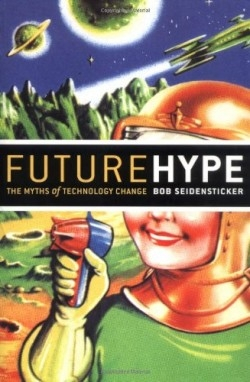
Bob Seidensticker
Berrett-Koehler
Unknown $16.95 (254pp)
978-1-57675-370-5
Buy: Local Bookstore (Bookshop)
According to the author, the Internet isn’t that big a deal. A former project manager at Microsoft, Seidensticker says the popular perception that modern technology is profoundly changing our lives is exaggerated and out of step with reality. He asserts that it’s human nature for people to overestimate the importance of new inventions, such as the Internet, while underestimating those they’ve grown up with—the car, the telephone, electricity. He cites dozens of older technologies, such as the telegraph and the railroad, as having had a far greater impact on human lives than the Internet. For a truly serious collision between technology and society, Seidensticker points to the Industrial Revolution and Great Britain during the first half of the nineteenth century.
While not new, Seidensticker’s hypothesis is convincing, provocative, and well supported with historical and contemporary examples. In Part I, he postulates nine myths about high tech—“change is exponential,” “technology is inevitable,” “the Internet changes everything” —and proceeds to deflate them systematically and perceptively. Discussing the myth of “the rising tide of valuable information,” Seidensticker derides it as a “flood of decreasing reliability” and argues that there’s a difference between information and knowledge. He suggests that the most important information has always had an outlet and that the flow of new information had no outlet in the past because it was not, and is not, very important. As an example of the wrong-headedness of the perception that the Internet changes everything, Seidensticker observes that e-commerce accounted for only two percent of the $3.6 trillion of total retail sales in 2004. He argues that rather than providing a new paradigm, the Internet merely offers a convenient alternative to existing facilities, such as stores and libraries.
Part II of the book, which focuses on the constancy of technological change, is less successful, essentially restating the argument that this is not the first generation to be astounded by technology, not the first to rearrange whole lifestyles to accommodate it. Seidensticker observes that only those people born before a technology becomes pervasive even think of it as technology. He concludes with some self-evident pointers for applying a clearer view of technology—avoid technology infatuation, resist alarmist claims that change is faster and faster. While not the first to throw a wet blanket on the enthusiastic sparks generated by new technology, Seidensticker, with his cachet as a former Microsoft insider and his shrewd and carefully reasoned presentation, will provoke discussion.
ROB MITCHELL (June 8, 2006)
Changing the Subject
Art and Attention in the Internet Age
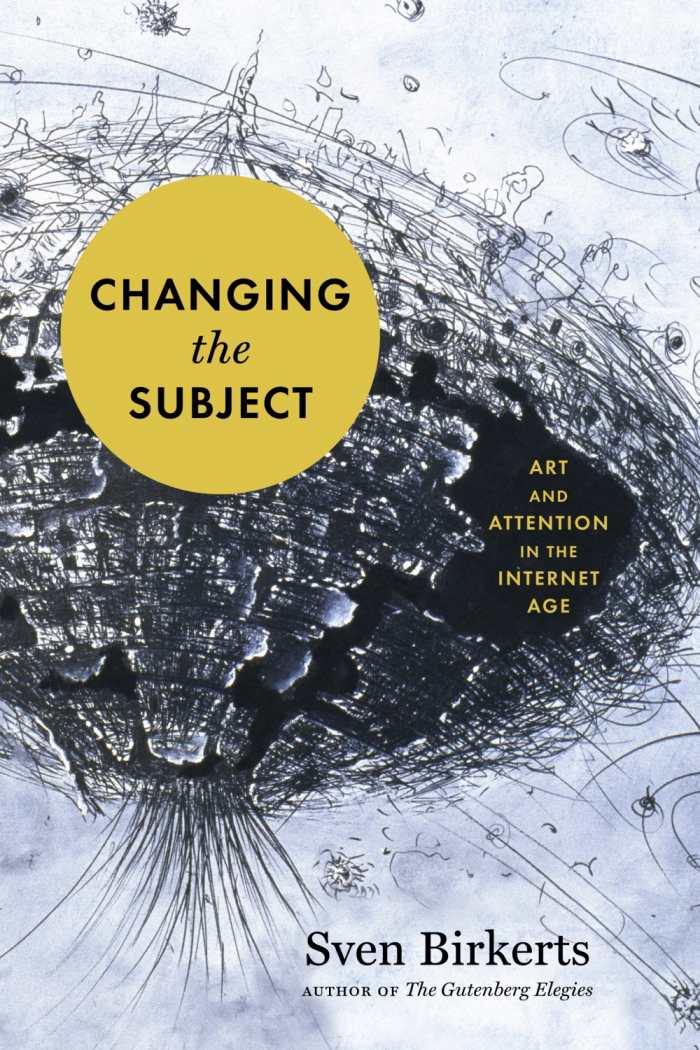
Sven Birkerts
Graywolf Press
Softcover $16.00 (272pp)
978-1-55597-721-4
Buy: Local Bookstore (Bookshop)
These seventeen exceptionally well-written essays explain that an unprecedented explosion of data injures the restorative nature of certain important ways of thinking.
Sven Birkert’s Changing the Subject: Art and Attention in the Internet Age is a vivid and eloquent look at how technology affects our reading habits and, ultimately, injures the restorative nature of material culture: novels, letters, bookshelves, and record-store shopping.
The new information culture—e-mail, e-readers, online news aggregates, apps—results in a trend of merely harvesting facts, Birkerts writes. What’s lost, or “demoted,” is certain ways of thinking—namely, reflection, imaginative projection, and contemplation.
This is not just another book demonizing technology while advocating mindfulness. Instead, Birkerts, an American essayist and literary critic, uses literature and poetic observation to exalt the aspects of culture that are overshadowed by what he calls the “unprecedented explosion of data.” He writes beautifully on the inherent experience of reading a novel, writing a letter, or even navigating a map. He argues that there is inherent value in a book and its ideas, taking up physical space in your hands and surroundings. Likewise, he describes the benefits of getting lost and feeling unconnected as chances to pull attention into one’s inner world.
As he writes, “The lapsing of time is part of what invests any experience with substance and resonance … with significance. There has to be a difference between earned knowledge and that which is dropped into our laps—or laptops. It is through earning, the work of achieving, that we establish our psychological claim on our experience.”
The seventeen essays, most of which have been published in scholarly journals, are not only exceptionally well written but also authoritative. They touch on decades of debate on the role of culture and the self, with references to literary greats like Virginia Woolf and contemporary essayists writing for The Atlantic.
While waxing on the famous Jeopardy! episodes in which Ken Jennings competed with the computer Watson, Birkerts provides the most compelling reason to unplug: to “get on with other business, the more existential business, pursuing fantastic artistic explorations, and having those soulful dialogues that, when they happen, feel like the ultimate point of living.”
AMANDA MCCORQUODALE (August 27, 2015)
Digital State
How the Internet Is Changing Everything
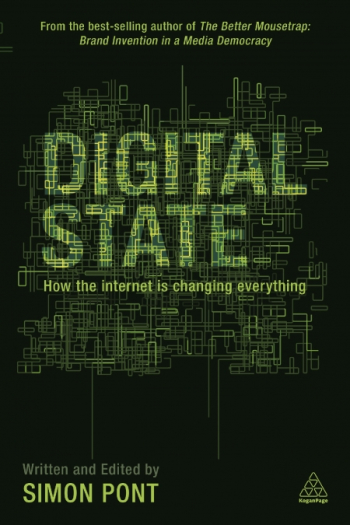
Simon Pont, editor
Kogan Page
Softcover $19.95 (256pp)
978-0-7494-6885-9
This compilation is a thought-provoking, “big picture” view of the digital state.
Digital State: How the Internet is Changing Everything, written and edited by Simon Pont, is an anthology of sixteen essays tracking the evolution of the Internet, and what it has meant in individuals’ lives, and for society as a whole.
Pont, also author of The Better Mousetrap: Brand Invention in a Media Democracy (Kogan Page, 2012), pens three of the essays, and the remainder are each written by different writers with a unique perspective on digital media, many from the fields of marketing and advertising. Topics include whether the Internet is having a positive or negative impact on society; the future of digital media; why marketing efforts need to adapt to the changing expectations among digital users; how the Internet is being used for activism; and legal issues, such as copyright, defamation, and privacy.
Providing a “big picture” view of the digital state, the book is not a how-to or practical guide offering specific advice about how to use digital media, but rather takes a philosophical and theoretical approach to defining and analyzing “the digital state,” drawing on concepts from Hegel, Heidegger, and McLuhan, as well as contemporary popular culture examples, such as television shows, books, and popular brands.
Pont introduces each essay, relating how he met the authors: Some worked with Pont at advertising and communications agencies; others work in journalism, law, and civil engineering; and one contributor is his brother, senior vice president at the investment firm PIMCO. Pont’s interjections personalize the book, provide context for the essays, and establish the writers’ backgrounds. They also give the book a conversational and friendly tone.
The information will appeal primarily to marketing and advertising executives — anyone building a brand and seeking to maximize the capabilities of digital media. The broadview, theoretical approach will also appeal to scholars studying new media.
A unique aspect of the book is that Pont is so transparent about the process of putting the anthology together, and his deliberate decision to use contributors rather than writing the book solely from his own perspective. He explains that he wants the process of exploring the topic of the digital state to be collaborative, reflecting a common theme discussed in the essays, specifically, the collaborative nature of the Internet.
While the essays are very personal, written from the writers’ distinct viewpoints about their experiences with digital media, the book is cohesive, with a thought-provoking, unified theme emphasizing how the digital state has changed so much in just a few years, and how it will continue to change in the future.
MARIA SIANO (August 6, 2013)
Digital Wars
Apple, Google, Microsoft & the Battle for the Internet
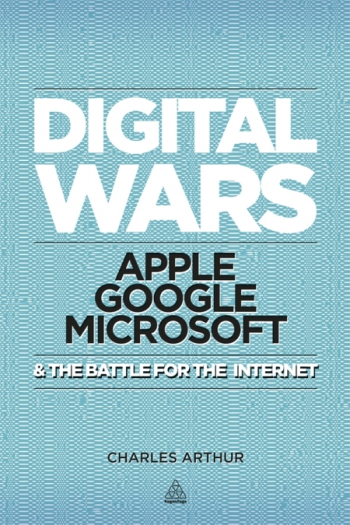
Charles Arthur
Kogan Page
Softcover $19.95 (264pp)
978-0-7494-6413-4
Numerous books have been written about the new breed of companies shaping our digital world. Charles Arthur’s offering distinguishes itself because the author, technology editor at the British-based Guardian, shares a journalist’s behind-the-scenes look at the interrelationships among powerhouse companies and their founders.
Digital Wars, as the title implies, is about the immense Internet battlefield and the three primary contenders for digital domination: Apple, Google, and Microsoft. Arthur uses a traditional timeline to structure the book, but it’s his ability to interweave the trials and tribulations of these companies that makes the story fascinating. Arthur includes interviews with company executives, his own observations, and expert commentary to offer insight into both the obvious and subtle differences in corporate management. Microsoft, not surprisingly, comes across as a dominant and dominating bully whose arrogance blinds it to the upstart Google, an innovative search company started by engineers that came along at just the right time. Apple, very much driven by Steve Jobs’s design and marketing acumen, appears to be the most visionary of the lot, rising from the flames of falling computer sales to launch the iPod, iPhone, and iPad, and emerging as a consumer electronics superstar.
Throughout the book, the reader witnesses not only the successes of the three giants, but the stumbles of their competitors. It is clear from Arthur’s narrative that huge opportunities were missed by companies like Yahoo! in the search market, Sony in digital music, and BlackBerry maker RIM in smartphones. But the real meat of the story—the “digital wars” fought by Apple, Google, and Microsoft—takes center stage.
While the author occasionally lapses into technical detail, for the most part he stays true to a journalistic tale of competitive intrigue. Along the way, the reader learns about a multi-faceted battlefield that includes fights over patents, divided loyalties over software platforms, personal relationships that transcend business ruthlessness, and breathtaking one-upmanship, where the risks are as high as the rewards.
Arthur takes the story from 1998, when Apple, Google, and Microsoft “found themselves sharing the same digital space,” he writes, through the Fall of 2011. Fittingly, he ends with the death of Steve Jobs. By the close of the book, it is clear that in little more than a decade, these three companies (and Facebook, which Arthur acknowledges as another major force) have completely changed the manner in which people worked, lived, and communicated via the Internet.
For anyone with an interest in how our digital world has evolved, Charles Arthur’s Digital Wars is required reading.
BARRY SILVERSTEIN (April 11, 2012)
The Googlization of Everything
(And Why We Should Worry)
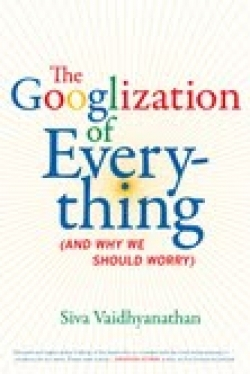
Siva Vaidhyanathan
University of California Press
Hardcover $26.95 (280pp)
978-0-520-25882-2
Buy: Local Bookstore (Bookshop)
With its myriad services and applications, Google seems to offer everything short of a cure for the common cold. According to Vaidhyanathan, a professor of media studies and law at the University of Virginia, however, that might not necessarily be a good thing. The author warns of the danger of putting too much trust in Google, which came on the scene in the late 1990s and has become perhaps the “go to” source for web searches, videos (YouTube), and blogging (Blogger). These services, along with a suite of online programs that include word processing and spreadsheets, come with a substantial price: a lack of privacy.
The author describes how Google keeps track of user preferences and proclivities during web searches, and how that information can be transferred into demographic data that has the potential to be used for nefarious purposes, despite the company’s motto “Don’t be evil.” It’s not only Internet searchers who are at risk, he warns. Websites and businesses vie for dominance in Google’s rankings, and go to great lengths to secure a place on the opening page, if not the number one spot. (Just how does Wikipedia, not known for careful editing and accuracy, manage to wind up at the top of the search so often?)
Vaidhyanathan takes his case beyond the shores of North America and discusses the impact the US-based Google has on foreign countries and the difficulties of language and culture differences for some users. One example: a town in France called Eu decided to change its name because that search phrase brought up too many other suggestions, such as the European Union, the element europia, or the Internet domain designation for Europe.
And while Google is practically worshipped in the US, more oppressive countries such as China, put heavy clamps in the form of censorship upon its use. Vaidhyanathan notes one particular “offshoot”—Google Books—as a wonderful idea fraught with problems. The philosophy was to digitize millions of volumes to make them available at no cost to web users, thus bridging nations and cultures through shared knowledge. Unfortunately, and perhaps unsurprisingly, Google’s management did not count on the publishers and authors who would insist on their copyright protection.
We have become lazy and dependent, the author warns, in trusting an entity that may or may not be there down the road. Readers might detect a whiff of paranoia in The Googlization of Everything, but that doesn’t mean there isn’t merit in the author’s musings. Remember the Trojan Horse.
RON KAPLAN (February 28, 2011)

Seth Dellon is director of audience development at Foreword Reviews. You can meet him or hear him speak at most of the events Foreword attends, and contact him at seth@forewordreviews.com
Seth Dellon
